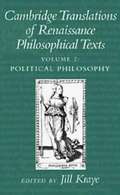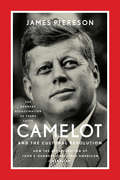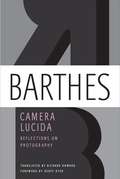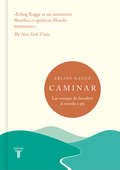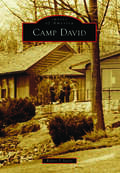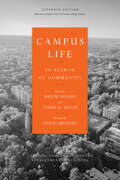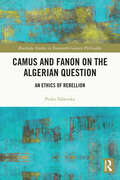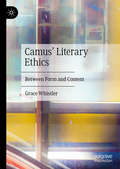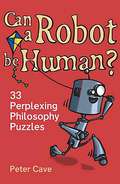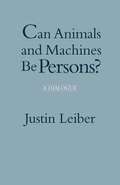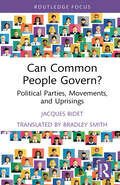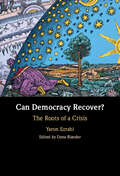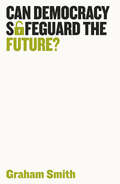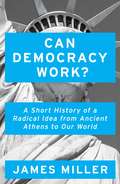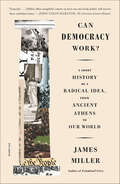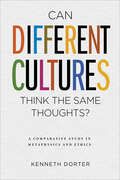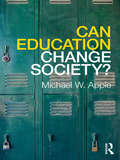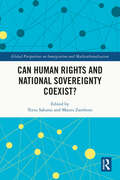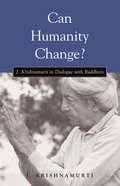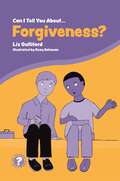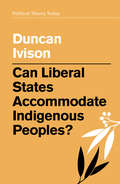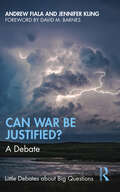- Table View
- List View
Cambridge Translations of Renaissance Philosophical Texts: Volume I Moral Philosophy
by Jill KrayeThe Renaissance, known primarily for the art and literature that it produced, was also a period in which philosophical thought flourished. This two-volume anthology contains 40 new translations of important works on moral and political philosophy written during the Renaissance and hitherto unavailable in English. The anthology is designed to be used in conjunction with The Cambridge History of Renaissance Philosophy, in which all of these texts are discussed. The works, originally written in Latin, Italian, French, Spanish, and Greek, cover such topics as: concepts of man, Aristotelian, Platonic, Stoic, and Epicurean ethics, scholastic political philosophy, theories of princely and republican government in Italy and northern European political thought. Each text is supplied with an introduction and a guide to further reading.
Cambridge Translations of Renaissance Philosophical Texts: Volume II Political Philosophy
by Jill KrayeThe anthology is designed to be used in conjunction with The Cambridge History of Renaissance Philosophy, in which all of these texts are discussed. The works, originally written in Latin, Italian, French, Spanish and Greek, cover such topics as: scholastic political philosophy; theories of princely and republican government in Italy; and northern European political thought. Each text is supplied with an introduction and a guide to further reading.
Camelot and the Cultural Revolution
by James PieresonJames Piereson examines the bizarre aftermath of John F. Kennedy's assassination: Why in the years after the assassination did the American Left become preoccupied with conspiratorial thinking? How and why was Kennedy transformed in death into a liberal icon and a martyr for civil rights? In what way was the assassination linked to the collapse of mid-century liberalism, a doctrine which until 1963 was the reigning philosophy of the nation?
Camera Lucida: Reflections On Photography
by Richard Howard Roland Barthes Geoff DyerA graceful, contemplative volume,Camera Lucida was first published in 1979. Commenting on artists such as Avedon, Clifford, Mapplethorpe, and Nadar, Roland Barthes presents photography as being outside the codes of language or culture, acting on the body as much as on the mind, and rendering death and loss more acutely than any other medium. This groundbreaking approach established Camera Lucida as one of the most important books of theory on the subject, along with Susan Sontag's On Photography.
Cameron and the Conservatives
by Timothy Heppell David SeawrightSpecialists in Conservative Party politics examine the effectiveness of the Cameron led coalition. The contributors examine Cameron as leader and Prime Minister; the Conservatives' modernisation strategy; the level of ideological coherence in 'liberal conservatism'; and the impact of the coalition on a range of policy areas and on 'New' Labour.
Caminar: Las ventajas de descubrir el mundo a pie
by Erling KaggeTras el éxito internacional El silencio en la era del ruido, Erling Kagge nos deleita con un libro sobre el placer de caminar. Libros que respiran y te hacen respirar. «Casi todos los problemas parecen distintos después de un paseo.» Al caminar, con o sin rumbo, nuestro cuerpo viaja a la velocidad de nuestra mente. Solo cuando damos un paso tras otro podemos descubrir la tierra que pisamos, y a nosotros mismos. La capacidad de andar erguidos nos convirtió en lo que somos, y al dejar de caminar abandonamos también nuestra esencia, nos convertimos en otra cosa. Este libro, una agradable caminata en excelente compañía, nos recuerda la alegría de las caminatas, breves o largas, y nos convence de que quien va a pie llega más lejos y vive mejor. En el camino, nuestros pasos se cruzan con figuras como Machado, Heidegger, Thoreau, Neruda o Steve Jobs. Erling Kagge, el autor que nos enseñó a encontrar el silencio en este estruendoso mundo, vuelve con un evocador libro sobre el placer y el equilibrio que se pueden encontrar en tan simple actividad. La crítica ha dicho...«Erling Kagge es un aventurero filosófico, o quizás un filósofo aventurero.»The New York Times «¿Quién mejor que un avezado explorador para hablarnos del silencio? El silencio está en todos lados. Basta con reconocerlo y saborearlo. Toda una filosofía de vida. Y también una nueva forma de lujo que ya tiene numerosos adeptos.»Le Figaro Magazine (sobre El silencio) «Una valiosa guía en la que Kagge da cuenta de los inestimables beneficios de encontrar la quietud. Para él, desconectar no significa alejarse del mundo. Al contrario: se trata de disfrutar más intensamente de la vida y de la compañía.»L'Express (sobre El silencio)
Camp David (Images of America)
by Robert P. SavittOriginally named Shangri-La by Franklin D. Roosevelt, today's Camp David was a well-guarded secret until its existence was revealed after World War II. A US Naval facility set on a mountaintop, Camp David's tight security has piqued the curiosity of Americans and foreigners. Prior to the outbreak of war, Roosevelt had access to the nearby presidential yacht as a "getaway" to escape the pressures of life in the White House. After a brief search of nearby locations, a site on Catoctin Mountain in Maryland was chosen as the place for the presidential retreat. It remained Shangri La until President Eisenhower said the name was "just a little fancy for a Kansas farm boy" and renamed it Camp David after his father and grandson in 1953. It has served as retreat for each succeeding president and, in addition to providing rest and relaxation, has been the setting of several historic meetings. Robert P. Savitt writes and lectures on a variety of historical subjects. He holds a doctoral degree from Georgetown University, served in the Departments of Defense and State, and was legislative director for a US senator. Savitt has authored three previous Arcadia Publishing titles.
Campus Life: In Search of Community—Expanded Edition
by Drew Moser Carnegie Foundation for the Advancement of TeachingIn 1990, under the direction of Ernest Boyer, the Carnegie Foundation for the Advancement of Teaching published a classic report on the loss of a meaningful basis for true community on college campuses—and in the nation. Now this expanded edition of Campus Life: In Search of Community reintroduces educational leaders to the Boyer report's proposals while offering up-to-date analysis and recommendations for Christian campuses today. Editors Drew Moser and Todd C. Ream have assembled pairs of academic and student-development leaders from top Christian colleges to offer a hopeful update on the practical contributions of Christian higher education to the practice of community. This volume includes new chapters, the long out-of-print Boyer report in its entirety, and a discussion guide to facilitate team conversations. Higher education now stands at a critical point, yet the contributors to this expanded edition of Campus Life see current challenges as an opportunity to revive Boyer’s commitment to its formative power. Contributors include: Mark L. Sargent and Edee Schulze of Westmont College Randall Basinger and Kris Hansen-Kieffer of Messiah College Brad Lau and Linda Samek of George Fox University Stephen T. Beers and Edward Ericson III of John Brown University Paul O. Chelsen and Margaret Diddams of Wheaton College Doretha O'Quinn and Tim Young of Vanguard University Christian higher education now stands at a critical point, yet the contributors to this expanded edition of Campus Life see current challenges as an opportunity to revive Boyer's commitment to understanding the formative power of Christian higher education.
Campus Wars: Multiculturalism And The Politics Of Difference
by John ArthurThroughout its history, the United States has struggled with the inevitable tensions of a highly diverse society. With the opening of higher education to women, ethnic minorities, and members of other previously marginalized groups, these tensions are now visited most especially upon our nation's colleges and universities. This collection addresses the most controversial issues now troubling our campuses: the content of the curriculum, sexual harassment and date rape, hate speech v. free speech, and affirmative action. In addition, several contributions probe the fundamental issues underlying the more specific problems of the "politics of difference." The contributions to this volume represent a wide range of disciplines - including philosophy, history, literary theory, law, economics, and politics - as well as views from across the political spectrum. Readers will find both familiar essays and new ones, arranged so that the authors speak directly to one another, thus providing a genuine conversation.
Camus and Fanon on the Algerian Question: An Ethics of Rebellion (Routledge Studies in Twentieth-Century Philosophy)
by Pedro TabenskyThis is the first book to offer a systematic comparison of the philosophies of Albert Camus and Frantz Fanon. It shows how the ethical, political, and psychological outlooks of these two influential thinkers can further our understandings of how to bring about justice in the face of deep power imbalances. The author foregrounds the bloody Algerian War of Independence in his analysis of the philosophies of Camus and Fanon. Although neither supported French colonial occupation of Algeria, they held radically different views of the conflict. Fanon supported emancipation through violence, which the author argues has been uncritically romanticized. Camus, on the other hand, supported an ethics of moderation that shunned indiscriminate violence. The author argues that Camus has been unfairly accused of being an apologist for colonialism. Finally, the author draws out the common endorsement of humanist values that drive both Camus’ and Fanon’s thought. Camus and Fanon on the Algerian Question will appeal to scholars and advanced students interested in twentieth-century Continental philosophy, postcolonialism, existentialism, and African philosophy.
Camus' Literary Ethics: Between Form and Content
by Grace WhistlerThis book seeks to establish the relevance of Albert Camus’ philosophy and literature to contemporary ethics. By examining Camus’ innovative methods of approaching moral problems, Whistler demonstrates that Camus’ work has much to offer the world of ethics— Camus does philosophy differently, and the insights his methodologies offer could prove invaluable in both ethical theory and practice. Camus sees lived experience and emotion as ineliminable in ethics, and thus he chooses literary methods of communicating moral problems in an attempt to draw positively on these aspects of human morality. Using case studies of Camus’ specific literary methods, including dialogue, myth, mime and syntax, Whistler pinpoints the efficacy of each of Camus’ attempts to flesh-out moral problems, and thus shows just how much contemporary ethics could benefit from such a diversification in method.
Can A Robot be Human?: 33 Perplexing Philosophy Puzzles
by Peter CaveCan you believe someone who says 'I'm telling the truth now'? Can a robot be human? What's the best way to win a game of chicken? And how do you know you're not dreaming right now? In this book of puzzles and paradoxes, Peter Cave introduces some of life's most important questions with tales and tall stories, jokes and arguments, common sense and bizarre conclusions. From how to get to heaven, to speedy tortoises, here are some of the most mind-bending problems in subjects like logic, ethics, art, and politics - and some tips on how to solve them! Illustrated with quirky cartoons throughout, The Unusual, Please! takes the reader on a taster tour of the most interesting and delightful parts of philosophy. For everyone who puzzles about the world.
Can Animals And Machines Be Persons?: A Dialogue
by Justin Leiber"This is a dialogue about the notion of a person, of an entity that thinks and feels and acts, that counts and is accountable. Equivalently, it's about the intentional idiom --the well-knit fabric of terms that we use to characterize persons. Human beings are usually persons (a brain-dead human might be considered a human but not a person). However, there may be persons, in various senses, that are not human beings. Much recent discussion has focused on hypothetical computer-robots and on actual nonhuman great apes. The discussion here is naturalistic, which is to say that count and accountability are, at least initially, presumed to be naturally well-knit with the possession of a cognitive and affective life. " --Justin Leiber, from the Introduction
Can Common People Govern?: Political Parties, Movements, and Uprisings (Marx and Marxisms)
by Jacques BidetIn Can Common People Govern?, the renowned French social theorist, philosopher, and historian Jacques Bidet offers a theoretical and political exploration of political parties, movements, and uprisings as forms of popular political organization. He highlights the contradictions of the party-form and the movement-form through a critical analysis of Lenin, Xi Jinping, Gramsci, Althusser, and the theorists of left-wing populism, Laclau and Mouffe. Popular political organization, he argues, must be related to the structure of modern society, in which the popular class is opposed in a “triangular duel” against a dominant class that includes two poles in conflictual connivance, “capitalpower” and “competence-power” (or “elite”). This duality offers the common people an angle of attack for a risky alliance with this elite against capital. This class confrontation is put in the context of the ongoing ecological disaster and popular uprisings. In the age of disaster, environmentalism and social emancipation must be conceived as one and the same thing.Can Common People Govern? is relevant to students of Marxism as well as wider readership interested in political thought and action.
Can Democracy Recover?: The Roots of a Crisis
by Yaron Ezrahi'Can Democracy Recover?' explores the roots of the contemporary democratic crisis. It scrutinizes the evolution and subsequent fragmentation of modern political epistemology, highlighting citizens increasing inability to make sense of the political universe in which they live, their loss of confidence in political causality, distinguishing facts from fiction and objective from partisan attitudes. The book culminates in a speculative discourse on democracy's uncertain future. This work is the final part in Yaron Ezrahi's trilogy. The first, 'The Descent of Icarus' (1990), explored the scientific revolution's role in shaping modern democracy. The second, 'Imagined Democracies' (2012), examined the collective political imagination's impact on the rise and fall of political regimes, emphasizing the modern partnership between science and democracy. 'Can Democracy Recover?' traces the political implications of the erosion of the Nature-Culture dichotomy, the bedrock of modernity's cosmological imagination, and anticipates the emergence of new political imaginaries.
Can Democracy Safeguard the Future? (Democratic Futures)
by Graham SmithOur democracies repeatedly fail to safeguard the future. From pensions to pandemics, health and social care through to climate, biodiversity and emerging technologies, democracies have been unable to deliver robust policies for the long term. In this book, Graham Smith asks why. Exploring the drivers of short-termism, he considers ways of reshaping legislatures and constitutions and proposes strengthening independent offices whose overarching goals do not change at every election. More radically, Smith argues that forms of participatory and deliberative politics offer the most effective democratic response to the current political myopia, as well as a powerful means of protecting the interests of generations to come.
Can Democracy Work?: A Short History of a Radical Idea, from Ancient Athens to Our World
by James MillerDemocracy today is widely regarded as an ideal form of government. Yet in practice it sometimes seems a sham, a political puppet show in which hidden elites pull all the strings. As trust in elected representatives around the world plunges, it is no wonder that democratic revolts have erupted – from Cairo to Kiev and beyond – in an effort to 'take back control'. In this urgent and lively history, James Miller reminds us that democracy has always generated tensions and contradictions. Through philosophical debates and violent uprisings, it has been contested, corrupted, and refined. In different times and different places – from ancient Athens to revolutionary France to post-war America – its meaning has shifted in surprising ways. For over two thousand years, the world has experimented with democracy. But can it really work – especially in complex modern societies?
Can Democracy Work?: A Short History of a Radical Idea, from Ancient Athens to Our World
by James Miller"Of all the books on democracy in recent years one of the best is James Miller’s Can Democracy Work? . . . Miller provides an intelligent journey through the turbulent past of this great human experiment in whether we can actually govern ourselves." —David Blight, The GuardianA new history of the world’s most embattled ideaToday, democracy is the world’s only broadly accepted political system, and yet it has become synonymous with disappointment and crisis. How did it come to this? In Can Democracy Work? James Miller, the author of the classic history of 1960s protest Democracy Is in the Streets, offers a lively, surprising, and urgent history of the democratic idea from its first stirrings to the present. As he shows, democracy has always been rife with inner tensions. The ancient Greeks preferred to choose leaders by lottery and regarded elections as inherently corrupt and undemocratic. The French revolutionaries sought to incarnate the popular will, but many of them came to see the people as the enemy. And in the United States, the franchise would be extended to some even as it was taken from others. Amid the wars and revolutions of the twentieth century, communists, liberals, and nationalists all sought to claim the ideals of democracy for themselves—even as they manifestly failed to realize them.Ranging from the theaters of Athens to the tents of Occupy Wall Street, Can Democracy Work? is an entertaining and insightful guide to our most cherished—and vexed—ideal.
Can Different Cultures Think the Same Thoughts?: A Comparative Study in Metaphysics and Ethics
by Kenneth Dorter&“A welcome contribution to the burgeoning multicultural revolution in philosophy . . . persuasively shows that ethics cannot be innocent of metaphysics.&” —Bryan W. Van Norden, author of Introduction to Classical Chinese Philosophy Kenneth Dorter&’s Can Different Cultures Think the Same Thoughts? is a study of fundamental issues in metaphysics and ethics across major philosophical traditions of the world, including the way in which metaphysics can be a foundation for ethics, as well as the importance of metaphysics on its own terms. Dorter examines such questions through a detailed comparison of selected major thinkers and classic works in three global philosophical traditions, those of India, China, and the West. In each chapter Dorter juxtaposes and compares two or more philosophers or classic works from different traditions, from Spinoza and Shankara, to Confucius and Plato, to Marcus Aurelius and the Bhagavad Gita. In doing so he explores different perspectives and reveals limitations and assumptions that might otherwise be obscure. The goal of Dorter&’s cross-cultural approach is to consider how far works from different cultures can be understood as holding comparable philosophical views. Although Dorter reveals commonalities across the different traditions, he makes no claim that there is such a thing as a universal philosophy. Clearly there are fundamental disagreements among the philosophers and works studied. Yet in each of the case studies of a particular chapter, we can discover a shared, or at least analogous, way of looking at issues across different cultures. All those interested in metaphysics, ethics, Indian philosophy, Chinese philosophy, and comparative philosophy will find much of interest in this book.
Can Education Change Society?
by Michael W. AppleDespite the vast differences between the Right and the Left over the role of education in the production of inequality one common element both sides share is a sense that education can and should do something about society, to either restore what is being lost or radically alter what is there now. The question was perhaps put most succinctly by the radical educator George Counts in 1932 when he asked "Dare the School Build a New Social Order?", challenging entire generations of educators to participate in, actually to lead, the reconstruction of society. Over 70 years later, celebrated educator, author and activist Michael Apple revisits Counts’ now iconic works, compares them to the equally powerful voices of minoritized people, and again asks the seemingly simply question of whether education truly has the power to change society. In this groundbreaking work, Apple pushes educators toward a more substantial understanding of what schools do and what we can do to challenge the relations of dominance and subordination in the larger society. This touchstone volume is both provocative and honest about the ideological and economic conditions that groups in society are facing and is certain to become another classic in the canon of Apple’s work and the literature on education more generally.
Can Human Rights and National Sovereignty Coexist? (Global Perspectives on Immigration and Multiculturalisation)
by Mauro Zamboni Tetsu SakuraiLooking at two of the key paradigms of the post-Cold War era–national sovereignty, and human rights – this book examines the possibilities for their reconciliation from a global perspective. The real or imagined fear of a flood of immigrants has caused and fuelled the surge of an amalgam of populist political forces, anti-immigrant movements, and exclusionist nationalism in many developed countries. In the last decade, we have witnessed the emergence of two phenomena in the political and legal spheres. On the one hand, there are liberal globalists asking for respect and the protection of the basic human rights of migrants and asylum seekers and arguing for their civic and social integration into host societies. On the other hand, there are growing calls for a tougher stance on immigration, and powerful populist politicians and governments have emerged in many developed countries. How can the idea of universal human rights survive exclusionist nationalism that uses a populist, unscrupulous approach to its advantage? The contributors to this book explore the meaning of, and possible solutions to, this dilemma using a wide range of approaches and seek appropriate ways of dealing with these normative predicaments shared by many developed societies. Scholars and students of human rights, migration, nationalism and multiculturalism will find this a very valuable resource.
Can Humanity Change?: J. Krishnamurti in Dialogue with Buddhists
by Jiddu KrishnamurtiMany have considered Buddhism to be the religion closest in spirit to J. Krishnamurti's spiritual teaching--even though the great teacher was famous for urging students to seek truth outside organized religion. This record of a historic encounter between Krishnamurti and a group of Buddhist scholars provides a unique opportunity to see what the great teacher had to say himself about Buddhist teachings. The conversations, which took place in London in the late 1970s, focused on human consciousness and its potential for transformation. Participants include Walpola Rahula, the renowned Sri Lankan Buddhist monk and scholar, author of the classic introductory text What the Buddha Taught.
Can I Tell You About Forgiveness?: A Helpful Introduction for Everyone (Can I Tell You About... ? Ser.)
by Rosy Salaman Liz GullifordMeet Joseph - Joseph is curious to understand more about forgiveness. He lost his sister's brand new football. Although she forgave him, he feels really bad. Can he forgive himself? He told his friend Billy a big secret, but Billy has betrayed his trust and told other kids at school. Should he forgive Billy, especially when he is yet to say sorry? Joseph's friend George is being bullied at school by Jasper. If George forgives Jasper, could Jasper go on to bully others in the future? This illustrated book is the ideal conversation starter for children aged 7+ to explore what forgiveness means, what it is and isn't and when it might and might not be appropriate.
Can Liberal States Accommodate Indigenous Peoples? (Political Theory Today)
by Duncan IvisonThe original – and often continuing – sin of countries with a settler colonial past is their brutal treatment of indigenous peoples. This challenging legacy continues to confront modern liberal democracies ranging from the USA and Canada to Australia, New Zealand and beyond. Duncan Ivison’s book considers how these states can justly accommodate indigenous populations today. He shows how indigenous movements have gained prominence in the past decade, driving both domestic and international campaigns for change. He examines how the claims made by these movements challenge liberal conceptions of the state, rights, political community, identity and legitimacy. Interweaving a lucid introduction to the debates with his own original argument, he contends that we need to move beyond complaints about the ‘politics of identity’ and towards a more historically and theoretically nuanced liberalism better suited to our times. This book will be a key resource for students and scholars interested in political theory, historic injustice, Indigenous studies and the history of political thought.
Can War Be Justified?: A Debate (Little Debates about Big Questions)
by Andrew Fiala Jennifer KlingCan war be justified? Pacifists answer that it cannot; they oppose war and advocate for nonviolent alternatives to war. But defenders of just war theory argue that in some circumstances, when the effectiveness of nonviolence is limited, wars can be justified. In this book, two philosophers debate this question, drawing on contemporary scholarship and new developments in thinking about pacifism and just war theory. Andrew Fiala defends the pacifist position, while Jennifer Kling defends just war traditions. Fiala argues that pacifism follows from the awful reality of war and the nonviolent goal of building a more just and peaceful world. Kling argues that war is sometimes justified when it is a last-ditch, necessary effort to defend people and their communities from utter destruction and death. Pulling from global traditions and histories, their debate will captivate anyone who has wondered or worried about the morality of political violence and military force. Topics discussed include ethical questions of self-defense and other-defense, the great analogy between individuals and states, evolving technologies and methods of warfighting, moral injury and post-traumatic stress disorder, broader political and communal issues, and the problem of regional security in a globalizing world. The authors consider cultural and religious issues as well as the fundamental question of moral obligation in a world saturated in military conflict. The book was written in the aftermath of the war on terrorism and includes reflection on lessons learned from the past decades of war, as well as hopes for the future in light of emerging threats in Europe and elsewhere. The book is organized in a user-friendly fashion. Each author presents a self-contained argument, which is followed by a series of responses, replies, and counter-arguments. Throughout, the authors model civil discourse by emphasizing points of agreement and remaining areas of disagreement. The book includes reader-friendly summaries, a glossary of key concepts, and suggestions for further study. All of this will help students and scholars follow the authors’ dialogue so they may develop their own answer to the question of whether war can be justified. Key Features Summarizes the debate between pacifism and just war theory Considers historical and traditional sources as well as contemporary scholarship and applications Models philosophical dialogue and civil discourse, while seeking common ground Discusses issues of concern in contemporary warfighting and peacemaking, while offering an analysis of the war on terrorism

